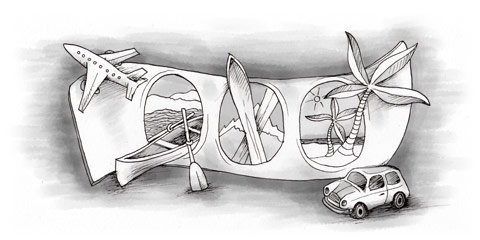If you plan to drive to Bulgaria you will need an International Driving Permit (as well as your national licence) and an international Green Card from your insurance company. If you plan to be driving through the countries of the former Yugoslavia you will have to pay for a local insurance policy at the border.
Getting to Bulgaria by car
Be aware of high motorway tolls in France and Switzerland; travelling via Germany is toll-free. If you don’t travel through Switzerland, there are no border checks or formalities until you reach Bulgaria.
From Vienna, the recommended route is via Budapest and Belgrade to Sofia. If you are looking to travel the approximate 2,300 km (1,400 mi) from London to Sofia, you should expect to be on the road for three days. For a longer, but more enjoyable journey, travel through Italy and catch a ferry to Greece, then drive on to Sofia. Ferries run throughout the year to Greek destinations and depart from Venice, Ancona and Brindisi.
Bulgarian Roads
Years of underinvestment have also left many roads in a poor state, and there’s only one motorway-quality road, running from Sofia to the border with Turkey. Bulgaria’s mountainous terrain and harsh winter conditions leave most roads potholed, dangerous and sometimes impassable.
Bulgarian roads have a reputation for being potholed tracks frequented by farm animals and agricultural machinery. There are only four major sections of dual-carriageway in the country. Otherwise even main roads are often narrow, with long stretches of damaged tarmac. In rural areas and in the mountains, be prepared for numerous hairpin bends and wandering livestock.
Main Roads
There are only four major sections of dual-carriageway in the country: from Sofia to Plovdiv, from Harmanli to the Turkish border, from Varna to Novi Pazar, and between Sofia and Jablanica (on the way to Pleven), only the first two of which are of motorway standard. The section of the A1/E80 between Plovdiv and Harmanli is under construction; when completed, there will be a dual-carriageway ‘motorway’ all the way from Sofia to the Turkish border, which should reduce some of the heavy, constant freight traffic on local roads between Plovdiv and Turkey.
The Bulgarian government signed a contract early in 2005 for a private company to build a motorway running from the Serbian border in the west to Sofia and on to Varna; when complete, this road will have a user-pays toll. There are currently no other toll roads in Bulgaria, as the vignette system (see above) functions as a road toll for all drivers.
Other Roads
The Bulgarian government is working to bring the main roads linking cities up to European standards. These are designated ‘E’ roads and are being slowly improved with EU funding. While some are in reasonable condition, be prepared to dodge potholes and to be stuck behind slow-moving HGVs en-route to western Europe for long periods.
Common hazards on Bulgarian roads include cars driving at night with damaged or no headlights, slow-moving or stationary livestock and farm machinery, people driving erratically (e.g. changing lanes with no indication and stopping suddenly for no apparent reason) and pedestrians. It’s usually recommended not to drive after dark in rural areas.
Road Pricing
Bulgaria recently introduced a user-pays system for all roads. If you drive to Bulgaria, you will need to purchase a ‘vignette’, available at the border when you enter the country. Vignettes for a passenger car cost €59 for a year, €10 for a month or €4 for a week and cover you for travel on all roads. Police check vignettes and issue an on-the-spot fine of €50 for vehicles (with up to eight seats) without a vignette or with one that has expired.
Speed Limits
Speed limits are 50 km/h (31mph) in built-up areas, either 90 km/h (56mph) on all roads and 130 km/h (81mph) on motorways; speed limit signs are in Roman numerals. On most main roads and motorways there is radar-control of speed. Exceeding the speed by more than 10km/h (6mph) could cost you up to €250, while a speed of 30 or more km/h (19mph) above the limit besides the fine will have your licence taken away for an year. Observe speed-limit signs carefully! If you commit a traffic offence, the police are authorised only to issue you with a ticket (citation) and there are no on-the-spot fines, yet drivers of cars with foreign registration plates are sometimes stopped and ‘fined’ for minor (or non-existent) breaches of road rules. It is, however, compulsory for all vehicle occupants to wear seatbelts. Talking on a mobile phone while driving is illegal unless you are using a hands-free set.
Other Laws
The maximum allowed alcoholic limit for drivers is 0.5% and 0.2% for bus and truck drivers. If you are caught having consumed anything above these limits, you will loose your license for 6 to 18 months. If you are caught having consumed anything above 1%, you could be sent to jail, even if you haven't caused an accident.
If an accident occurs due to potholes or other obstacles on the road, you will be charged with weak control of the car, even if no one is injured. Ladies are not allowed to wear high-heeled shoes when driving either.
During the period from the 1st of November until the 1st of march, it is compulsory to drive with head lamps on and to carry snow chains in the boot of your car.
This article is an extract from Buying a Home in Bulgaria
from Survival Books.

